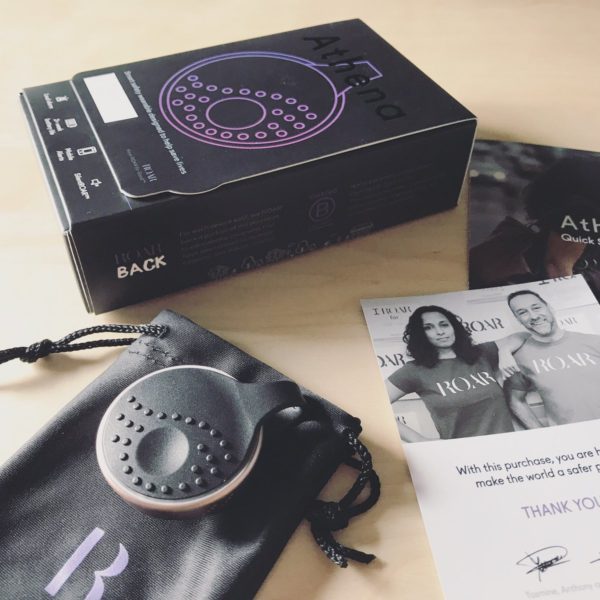After years of developing and fundraising for the Athena, a wearable personal safety device, ROAR for Good CEO Yasmine Mustafa and other members of the team announced that they will be officially discontinuing the device and the ROAR Mobile Safety App at the end of this year.
It’s part of the company’s plan to pivot to B2B services, using the Athena’s technology in the hospitality space for a new product.
Though the company considered fields like social work, education and hospitals’ psychiatric wards, it was the hospitality market which ultimately checked the boxes — financially and from a social impact stance — by offering housekeepers a tool that will make them feel protected against sexual harassment or assault, a rampant problem the industry faces, cofounder Mustafa told Technical.y earlier this year. The tool, called AlwaysOn, focused on ensuring the protection of vulnerable workers by providing the most reliable, best-of-class technology to ensure help is there when needed.
“We believe no one should be afraid to earn a wage and have shifted our focus to workplace safety and our newly launched product is addressing this important problem,” the company’s Tuesday morning announcement said.
Customers will no longer be able to use Athena and the ROAR Mobile Safety App after this year. Sales of the device were halted this past January.
“While we’re unable to endorse other products, you can find similar devices and research customer reviews by searching for ‘personal safety button gps’ on Amazon,” team members wrote. “Thank you for the passion and support you’ve contributed to this community. It has been an honor and a privilege to serve you and we will continue to fight for safety and equality in this new model.”
The formation of ROAR for Good was announced in 2014, after Mustafa spent months traveling alone and heard stories of assaults from other female travelers. The company kicked off a crowdfunding campaign in October 2015 for the Athena, which exceeded its funding goal by 566%.
The product got national attention, and Mustafa was honored with accolades including the BBC’s 100 Women list in 2016. But the company took about two years to ship orders, as the product’s original manufacturer couldn’t handle the deluge of orders that came through ROAR’s crowdfunding campaign.
That turned out to be a “blessing in disguise,” cofounder Anthony Gold told our sister site, Generocity, in 2017. The team picked FLEX, the California-based company that says it produces 75% of today’s wearable tech, as its new manufacturer.
But quickly, the company struggled to sustain the traction it got during the campaign. The growth of the wearables market stalled, and the novelty of a safety device like Athena began to wear off as similar devices hit the market, Mustafa told us earlier this year. It was one of many indicators that a pivot was necessary.
After assessing the needs of the market and their customers, Mustafa began shifting ROAR’s business model toward B2B services and scaled the team of 10 down to five.
The tech behind the product has also had to shift. In the hospitality context, staffers in distress would need to send a signal that pinpoints the room and floor they’re in, often inside massive complexes.
Mustafa told Technical.ly on Tuesday that the product is already being used in “a handful of hotels.” ROAR also raised $875,000 in VC funding earlier this fall.
“We’re grateful for you and the passionate community that has ROAR’ed as we ran our crowdfunding campaign, shipped our products, and launched new features,” the company’s statement said. “We did everything we could to help the business grow, but unfortunately, we could not find a sustainable business model to keep offering Athena as-is.”
Those currently using the product will be able to do so through Dec. 31, 2019.
Join our growing Slack community
Join 5,000 tech professionals and entrepreneurs in our community Slack today!
Donate to the Journalism Fund
Your support powers our independent journalism. Unlike most business-media outlets, we don’t have a paywall. Instead, we count on your personal and organizational contributions.

National AI safety group and CHIPS for America at risk with latest Trump administration firings

The good news hiding in Philly’s 2024 venture capital slowdown

How women can succeed in male-dominated trades like robotics, according to one worker who’s done it


